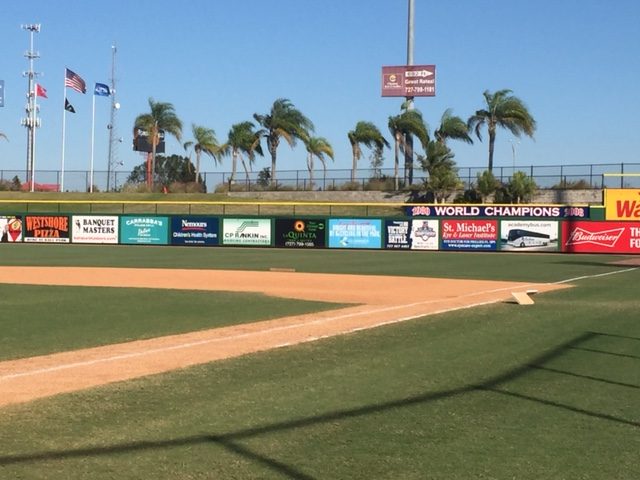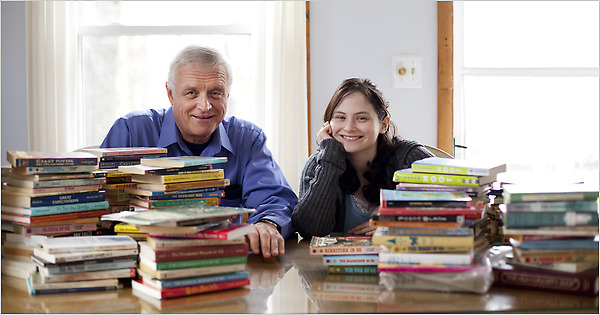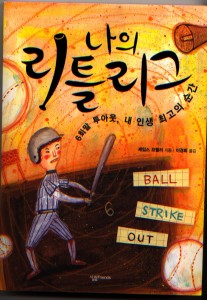–
 True story: I was having a wonderful time in Clearwater, Florida, playing for the Albany Capitals in a men’s 50-up hardball tournament. The team had rented condos on the beach, I had a great view from my balcony, the fields were pristine, I was playing reasonably okay.
True story: I was having a wonderful time in Clearwater, Florida, playing for the Albany Capitals in a men’s 50-up hardball tournament. The team had rented condos on the beach, I had a great view from my balcony, the fields were pristine, I was playing reasonably okay.
I was the crafty lefty who could still get batters out with an array of slop. Hey, that’s not a terrible thing.
–

All smiles before the game. I had to get a photo of this teammate, who we called “ZZ” for obvious reasons.
And then, while playing RF at beautiful Spectrum Field (home of the Phillies A-level minor league team), I ran a long way to field a fly ball on the line. I got there but lost the ball in the lights at the last moment. And wham, the ball hit me directly in the face. I was stunned and embarrassed and deeply concerned about my health. It reach for my nose; it was still there. I felt blood pooling in my mouth. The roof of my mouth seemed wholly altered. I checked for my teeth. And I did not wonder, not for one second, what happened to the baseball or the baserunners or the score of the game. I just wanted to be okay.
Minutes later, I was on the bench, spitting out huge amounts of blood, grateful that I still had my teeth. For the moment, at least. Next I took a trip to Urgent Care. One nurse looked at me, said, “Oh my gosh,” and sent me to the hospital. They insisted I spend the night. CT scans, and so on.

The game was at a “real” minor league field. Sweet dugouts with a tunnel that led to indoor batting cages and locker rooms. I took this photo a few minutes after sitting on the bench, spitting blood, dazed and down-hearted.
–
The next day, after an overnight in the hospital — fearing these Florida doctors, who didn’t seem to know anything — who kept talking about “pulling teeth” and “multiple fractures” and “possible bleeding in my brain” — I flew back home to NY for a hasty visit with an oral surgeon.
Goodbye Florida, three nights early. It was totally great until it suddenly so wasn’t.
Yesterday, with my wife at my side, the evaluation was far more optimistic than I’d been led to believe. Overall, no structural damage. My cheekbones, my jaw, good. My upper palate suffered some trauma but should heal itself. Some teeth might not make it, but maybe they will. Soft foods for next 10 days. We’ll wait and see how the body reacts.
–
I didn’t lose an eye. Whatever is broken can be repaired. I’m okay. Amazingly.
I caught a baseball with my face and I’m going to be perfectly fine.
So now I am left feeling sheepish, a little humiliated. The day before, I had pitched a solid game against a very good team, leaving in the 8th inning with a slim lead. The story in my head was a good one. I was 56 years old, having a great time in Florida, still competing, still a semi-athlete who can help his team win games. The next day I’m knocked down in the outfield, the ball is bouncing away, and I’m wondering what in the world I’m doing out here. Playing the outfield under the stupid lights. I hadn’t played a night game in over 17 years. I always play in natural light. My eyes are failing. I’m getting old and diminished. Who was I fooling?
I felt, right then, like an idiot. Ashamed. Never again, I thought to myself.
And yet 24 hours earlier, my story was completely different. Which one was true? Which image of myself was accurate?
I think in the end both narratives are true. Like Whitman said, I am large; I contain multitudes. I’m both things, the still-good player and the diminished fool with failing eyes and lost skills. I got injured and it was completely my fault. No one to blame but myself.
So now I’m home with a sore face and luscious, full lips. I might finally lose that last 5 pounds I’ve been unable to take off. I’ll work on Monday. And we’ll see how it goes.
Life turns on a dime, doesn’t it?

A quick snap back when everything was going great, glad to be exactly in that spot, preparing to play another ballgame.
















